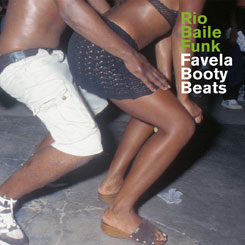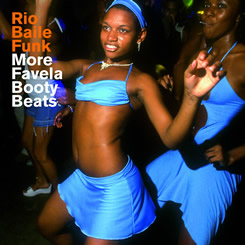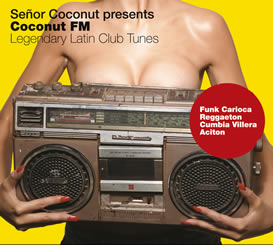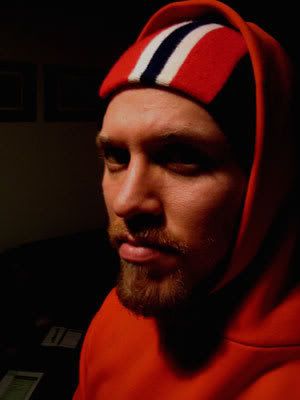For Daniel it all started in 2002 when a friend of his brought two cds of baile funk from Rio. "That really opened my eyes. I had been a big fan of brazilian music, but at one point I got really bored of the whole bossa and samba thing and also it's european interpretations. I thought they just reproduced the clishé of brazilian music, 60's and 70's bossa, that is music of the past. That's why I was so enthusiastic when I heard baile funk for the first time. I didn't know there was this whole electronic music movement happening in Brazil, totally autonomous, existing outside of the western electronic music realm. As a Berlin guy I always thought I know everything that happens in electronic music, but when I heard baile funk I thought: "Wow, no one plays this music and it's so energetic and raw."
Besides brazilian music Daniel was also fed up with over produced, bling hip-hop: "I thought baile funk was a sonic hip-hop innovation, still unknown to me. It reminded me of old Def Jam recordings: Public Enemy, LL Cool J and Run-DMC."
So he started doing research on baile funk and got frustrated quite soon because you couldn't hear any of it in Europe at that time: "So in January 2004 I decided to go to Rio and check out the scene myself. But as I didn't speak any portuguese, it was really difficult for me to communicate with people." Luckily a friend of his, Andreas Schoyerer, was living in Rio and started to investigate baile funk with him and they managed to establish connections with labels, DJs and producers in Rio. "Before 2004 there were no international labels interested in licensing baile funk, so the local labels were astonished when we wanted to publish their music in Europe. And they didn't know anything about licensing, they didn't know about invoicing, so we had to establish a whole new infrastructure."
Out of that trip came out the first compilation, which was Rio Baile Funk - Favela Booty Beats, released in the summer of 2004 on Essay Recordings, run by Daniel and Shantel, a Frankfurt based DJ. "It was the first official baile funk compilation in Europe and I think it gave access to baile funk to many people around the world. I mean some tracks were available before that in the internet, but it was quite difficult the find the good ones and to get them in a proper sound quality. For me it was a nice task to compile the best of baile funk, because all the labels were very cooperative. In the beginning it was so strange to them that a gringo would come and want to license their music, that they would happily give me any tracks I wanted. So the first compilation is based on tracks from Furacão 2000, Curtisom and Link, which is Marlboro's label. But for the second compilation we released (Rio Baile Funk - More Favela Booty Beats) Marlboro kind of spoiled the game, because I wanted to get some of his tracks for the compilation and he said that "Either you use exclusively Link tracks, or you don't use them at all." I didn't want to be black mailed so I didn't take any of his tracks.
In a situation where Marlboro owns the rights of at least half the baile funk produced in Rio, it made the licensing more difficult. "Yeah, he has many of the cool tracks and some of the best artists, but he has this kind of 'fuck off' mentality towards foreign labels. But some people also obey to his demands; so far he's realesed three albums in Europe of exclusively his catalogue. Compilations like ’Funk Carioca’ on Mr.Bongo, or the two Funk Carioca compilations that were released in Portugal are all exclusively based on Link catalogue material. But I think it's really harming for baile funk, because if music can't flow freely, it's damaging the music."
Nowadays Daniel is mainly working directly with the artists and producers themsleves. "It's better to pay the artists directly, because brazilian labels are notorius for not paying their artists. They get a flat fee per track they deliver and never see any royalties. For example when I met Dennis DJ in October 2005, he didn't know that he's tracks had been featured on my compilation and played in clubs in Europe, simply because Furacão 2000 hadn't bothered to tell him. Many of the artists on the compilations probably still don't know that they have stuff out in Europe."
After the two succesful compilations Daniel left Essay Recordings and founded his own label Man Recordings in 2005. "I wasn't agreeing on the artistic direction Essey was going. They were focusing on gypsy music, and I wanted to focus more on baile funk and hip-hop orientated music. So that's why I started Man Recordings." So far he has released nine vinyls and two cds, most of them material with Edu K, an mc from Porto Alegre in the south of Brazil, Edu K is the author of "Popuzuda Rock'n'roll", one of the biggest cross-over baile funk hits with heavy guitars, opening the way to current hit groups like Bonde do Role.
By nature baile funk is not music played on vinyl, but on cd. Since the late nineties CD-DJ-players became more popular and affordable for the Rio DJs and pressing of vinyls stopped. "Baile funk on vinyl is luxury. So for me as a label, I really don't get any money out of it, I do it because I love baile funk. I'd like to put more stuff out, but it's still not so easy to license it from the Rio labels. There are some people finding tracks in internet and putting the out on bootleg white labels, without any cretids, without paying royalties and I really can't support this. These artists are already ripped off by Rio labels and then again by some middle class white kids. I mean, these artists live in shitty houses and never get access to play in Europe because people practicly steal their music. So that's why I don't do any bootlegs, I license the music, artists get paid, they get advance and proper contracts; I wanna treat them as proper artists."
This year Daniel is beginning two new series of releases on vinyl: Funk Mundial and Baile Funk Masters. "Funk Mundial is a series where the brazilian mcs get to work with european producers. First one already came out and has Edu K with Stereotyp and the second is gonna be mc Xana with Zynden and Hervie from Dubside Records."
Baile Funk Masters is a series dedicated to the producers. "I want to show the producer side of baile funk, because many of the sonic innovations in baile funk are created by the DJs and the producers and not the mcs who are always on the spotlight. There are hundreds of producers in Rio, but there are few that stick out. The first one, which is DJ Sandrinho's EP, is instrumental only. It's also a DJ tool and I wanted to offer it to people as a base for remixes and mash-ups. More and more people are doing baile mash ups with r'n'b and hip-hop acapellas, but they always use the same tamborzão beat and the same samples, so I wanted to present some alternatives. But the series also works as promotion for the DJs; Sandrinho is one of the few who have been playing in Europe frequently, but he is still quite unknown for the public. And as he intends to do more live gigs and production in Europe, he can use this as a card to present himself and to get some name."

Sandrinho's vinyl EP comes out during March and it's also available in digital formats from Beat Port and iTunes. Coming up are releases with Sany Pitbull (who was finishing the mixing at the time of the interview), DJ Edgar, who is Mr. Catra's Dj, and Grand Master Raphael or Amazing Clay.
Sandrinho has also been playing in Berlin as a guest in Daniel's party series, Berlin Baile Funk Sessions, along with Marlboro, Diplo and Mr Catra with DJ Edgar. "Even though there's a new generation of DJs and clubbers searching for alternatives for the dominant 4/4 beat, It's always difficult to get the audience going the whole night on baile funk, you have to mix it with hip-hop, grime or reggaeton. I've been trying to cultivate baile funk in Europe for three years now, and I can see that there's more and more people getting into it, but it's not like it's a revolution for the average electronic music listeners."
Still, Daniel believes baile funk has a lot of potential to gain. "When I heard it for the first time, I thought this is gonna be a big thing, because it's energetic, it's party music and great to rave to. There's no other way of consuming baile funk then with your body; you can't just lay on the bed listening to it, you have to get up and dance. Baile funk is not yet at it's peak in Europe. But it still lacks the critical mass, to make a movement out of it; there are still so few people doing it. There's Johan in Stockholm, Rumble in Gothenburg, Rio Rocks parties of LJ Small in London, Favela Chic in Paris, DJ Gü-mix in Vienna and that's about it. But now there's a good network of people playing baile funk, so we can bring more artists to Europe. Sany Pitbull will come in June, DJ Sandrinho and Deise Tigrona is coming in April. And anybody who's interested in booking them or anybody else, please contact me by e-mail or at myspace."
"If a DJ from Rio plays in Europe a one on one Rio set, people probably won't understand it. Funk needs to be brought and translated to european audiences. The success of Bonde do Role could be one key to it." But baile funk is already going European: "There's a swiss guy who has baile funk songs in swiss german on his myspace and in Bucharest a friend of mine saw a gypsy rapper doing baile funk in romanian. So it's obvious it will happen sooner or later. Historically all the music coming across the atlantic have had some european intrepretations. For example, today basically every european country has already a local native tongue reggae scene."
"It's interesting time for baile funk now. Western people will eventually twist it someway, it probably would never have gone in Brazil. Just imagine if some guy like Timbaland would pick up baile funk and its production style, and make something new out of it with western production standards; with a good hi-fi sound and crisp bass lines. Or if ragga mcs would pick up baile funk beats and chant over them. So now it gets interesting to see what kind of fruits all this will produce and what will be its repercussion in Brazil."
"It's the nature of music, it travels and emerges out of dialogue with other cultures and other music. That's also what happened with baile funk itself: It started from Trans Europe Express by Kraftwerk in Germany, which was sampled by Afrika Bambaataa in NY in Planet Rock, that led to Miami Bass and that came down to Brazil, transformed to baile funk and now it's going back to Germany again. It's like a circle closing. Before the musical innovations were connected to certain cities, but I think in the future they will be made in the internet communities. But of course there will always be regional sounds and flavors and I'm shure that in the next couple of years there will be hundreds of regional styles of electronic music, like kuduro and kwaito, emerging for the world audience."
The success of baile funk abroad has lifted it's profile also in Brazil. "In Rio baile funk was always considered to be gutter music: ganster music from the favelas, not worthy for the average brazilians, but now the focus has changed in the media."
In Daniel's opinion baile funk's popularity in Brazil also spoils a bit it's edge and ruffness, since the artists want to please a wider audience. "Since Leozinho's Ela Só Pensa Em Beijar with this romantic mood and acoustic guitar was a huge hit in 2005, I noticed there was more these kind of soft, melodic songs made. Some artists realised that if you do this kind of romantic songs you get to the pop charts and tv. Earlier there was only Bonde do Tigrão signed to a major label, but then the lead singer killed his girlfriend and the press jumped on them: "You see, even though they were on Sony and tv, but they are still the same roughnecks we always warned you of." So now with Leozinho there is this new cheesy, romantic side of baile funk that could spoil it's edge."
"Some people in Rio are scared of baile funk because it's violent and sexual and relfects the favela complex, but really it's a platform in which the favelas can communicate to each other, because they don't have access to the official media. It's like the favela CNN."
Check out also:
Daniel’s homepage
Man Recordings
Mixes and videos
Edu K
Sandrinho’s EP
Stereotyp with Edu K 12”



















